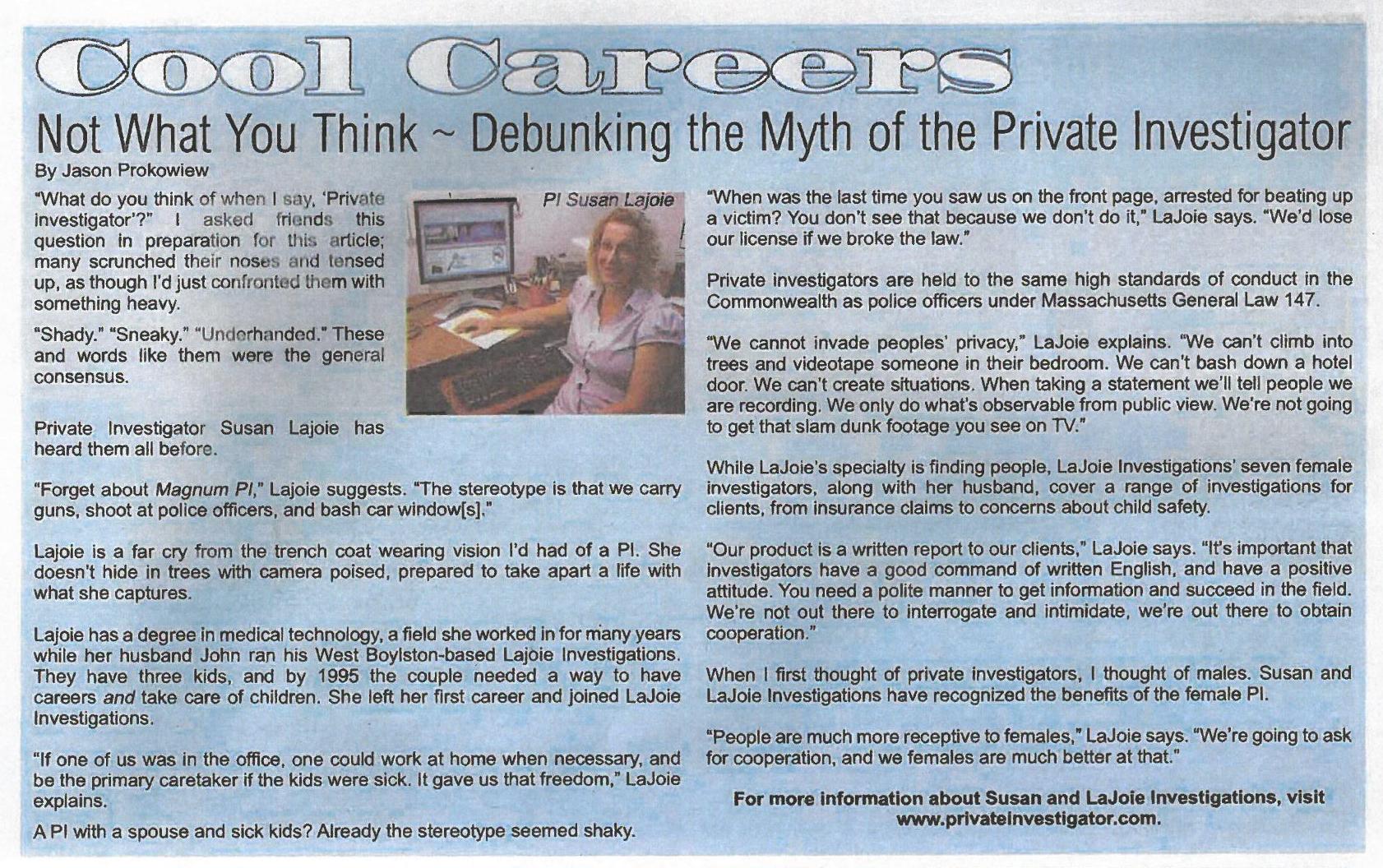-
Not What You Think ~ Debunking the Myth of the Private Investigator
What do you think of when I say, ‘Private Investigator’?” I asked friends this question in preparation for this article; many scrunched their noses and tensed up, as though I’d just confronted them with something heavy.
“Shady.” “Sneaky.” “Underhanded.” These and words like them were the general consensus.
Private Investigator Susan Lajoie has heard them all before.
“Forget about Magnum PI,” Lajoie suggests. “The stereotype is that we carry guns, shoot at police officers, and bash car window[s].”
Lajoie is a far cry from the trench coat wearing vision I’d had of a PI. She doesn’t hide in trees with camera poised, prepared to take apart a life with what she captures.
Lajoie has a degree in medical technology, a field she worked in for many years while her husband John ran his West Boylston-based Lajoie Investigations. They have three kids, and by 1995 the couple needed a way to have careers and take care of the children. She left her first career and joined Lajoie Investigations.
“If one of us was in the office, one could work at home when necessary, and be the primary caretaker if the kids were sick. It gave us that freedom,” Lajoie explains.
A PI with a spouse and sick kids? Already the stereotype seemed shaky.
“When was the last time you saw us on the front page, arrested for beating up a victim? You don’t see that because we don’t do it,” Lajoie says. “We’d lose our license if we broke the law.”
Private investigators are held to the same high standards of conduct in the Commonwealth as police officers under Massachusetts General Law 147.
“We cannot invade peoples’ privacy,” Lajoie explains. “We can’t climb into trees and videotape someone in their bedroom. We can’t bash down a hotel door. We can’t create situations. When taking a statement we’ll tell people we are recording. We only do what’s observable from public view. We’re not going to get that slam dunk footage you see on TV.”
While Lajoie’s specialty is finding people, Lajoie Investiagtions’ seven female investigators, along with her husband, cover a range of investigations for clients, from insurance claims to concerns about child safety.
“Our product is a written report to our clients,” Lajoie says. “It’s important that investigators have a good command of written English, and have a positive attitude. You need a polite manner to get information and succeed in the field. We’re not out there to interrogate and intimidate, we’re out there to obtain cooperation.”
Jason Prokowiew, www.thepulsemag.com
The Pulse Magazine, December 2010
- Navigation
- Home
- About Us
- » Our Team
- » Founding Father
- » Affiliations
- Investigative Services
- » Insurance Defense
- » Legal Investigations
- » Surveillance Investigations
- » Locates / Missing Persons
- » Statements & Interviews
- » Background & Due Diligence
- » Asset and Financial
- » Social Media & Information
- » Criminal Defense Investigations
- Books
- » Our Books
- » Book Testimonials
- Advertise
- Contact
- Item
Cool Careers: Not What You Think ~ Debunking the Myth of the Private Investigator
December 6, 2010 | Susan Lajoie
For More Information Call Us @ 800.435.8084
PO Box 673, Sterling, MA 01564, 508-835-2211, LII@PrivateInvestigator.com
All content and images contained within this website are property owned by Lajoie Investigations, Inc.
Unauthorized use of any content or imagery will result in appropriate legal action.





